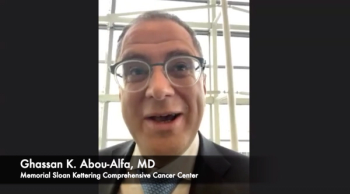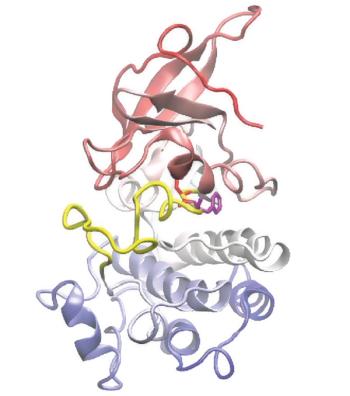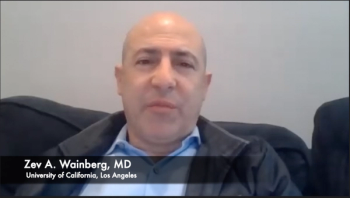
“The pendulum is moving fast towards giving chemotherapy prior to surgery, and the research is going on to continue that trend.”

Your AI-Trained Oncology Knowledge Connection!


“The pendulum is moving fast towards giving chemotherapy prior to surgery, and the research is going on to continue that trend.”

On this episode of the Oncology® Peer Review On-The-Go, Emily Smith, MD, discussed a patient case of basal cell carcinoma she and colleagues published in the journal ONCOLOGY®.

A combination of sitting for longer periods a day and a lack of physical activity resulted in a higher risk of death than those who partook in physical activity.

Patients with recurrent cervical cancer appeared to achieve a promising survival benefit following treatment with cemiplimab.

Ghassan K. Abou-Alfa, MD, examined the trial design of the phase 3 HIMALAYA trial of tremelimumab plus durvalumab for frontline hepatocellular carcinoma, with results presented at the 2022 Gastrointestinal Cancers Symposium.

In an interview with ONCOLOGY®, Megan May, PharmD, BCOP, offers a comprehensive review of real-world treatment considerations of mobocertinib as therapy for patients with lung cancer.

A phase 3 study from China identified that gonadotropin-releasing hormone analogs administered with chemotherapy reduced the risk of premature ovarian insufficiency among premenopausal patients with breast cancer.

ONCOLOGY co-editor-in-chief Julie M. Vose, MD, MBA, re-caps the 2021 American Society of Hematology conference and discusses which presentations were the most important.

Findings from a study indicated that patients with melanoma who had a high fiber diet experienced better responses to immunotherapy.

A report from the American Association for Cancer Research described how the COVID-19 pandemic has impacted cancer care and research, and how the space has since adapted.

The FDA's Oncologic Drugs Advisory Committee stated that additional clinical research demonstrating applicability within the United States is necessary to support the biologics license application for a sintilimab combination regimen for non–small cell lung cancer.

Findings from an analysis assessing diverse participation in multiple myeloma FDA drug approval trials highlighted a significant deficit of Black and Hispanic patients.

A phase 2/3 trial found that patients with low-grade serous ovarian cancer treated with trametinib had improved survival over the standard of care.

A substudy of the European‐Myeloma-Network‐02/Hovon‐95 trial suggests flow cytometry–based monitoring of minimal residual disease is effective for longitudinal evaluation of responses in patients with multiple myeloma.

Amitkumar Mehta, MD, detailed encouraging data presented at the 63rd ASH Annual Meeting for treating mantle cell lymphoma.

Treatment with trifluridine/tipiracil plus bevacizumab trended towards favorability despite not demonstrating statistically significant superiority in patients with metastatic colorectal cancer.

Patients with metastatic castration-resistant prostate cancer treated with apalutamide and prednisone experienced a better radiographic progression-free survival vs an active and established comparator regimen.

Treatment with an aromatase inhibitor appears to reduce the risk of breast cancer recurrence in patients who are premenopausal and undergoing ovarian suppression vs tamoxifen.

The phase 2 PERMEATE trial yielded positive results in the combination of pyrotinib plus capecitabine in patients with HER2-positive breast cancer and brain metastases.

Patients with chronic lymphocytic leukemia experienced functional T cell and antibody responses after receiving a vaccine for COVID-19, according to a prospective study.

Pembrolizumab for patients with persistent, recurrent, or metastatic cervical cancer who received chemotherapy with or without bevacizumab had longer progression-free and overall survival vs placebo-treated patients.

In patients with completely resected non–small cell lung cancer with mediastinal N2 involvement, postoperative radiotherapy was not associated with an increase in disease-free survival.

Safety findings from the phase 1 ASPEN-01 trial support the use of evorpacept with or without pembrolizumab or trastuzumab for patients with advanced solid tumors.

Treatment with armodafinil did not result in a significant difference in cancer-related fatigue between treatment arms for patients with high-grade glioma.

The phase 3 SIENDO trial, examining the use of frontline maintenance selinexor after combination chemotherapy in patients with advanced or recurrent endometrial cancer, met its primary end point of a statistically significant improvement in progression-free survival.

Research from a 2-part, phase 2 trial found that ibrutinib and rituximab followed by hyper-fractionated cyclophosphamide, vincristine, doxorubicin, and dexamethasone produced positive response data and a manageable safety profile for younger patients with mantle cell lymphoma.

Zev A. Wainberg, MD, discusses future research efforts for the treatment of patients with advanced gastric cancer.

Consolidation therapy with bortezomib, lenalidomide, and dexamethasone plus lenalidomide maintenance improved progression-free survival in patients with newly diagnosed multiple myeloma.

PDS Biotechnology Corporation announced that the combination of PDS0101 and pembrolizumab achieved preliminary response efficacy for patients with advanced human papillomavirus–associated head and neck cancer.

Patients with HER2-positive breast cancer who were treated with trastuzumab deruxtecan experienced favorable activity and reduction or loss of HER2 expression.